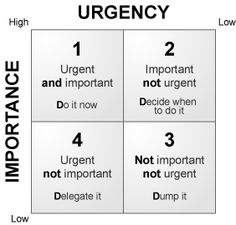Time – Can You Ever Get Enough?
Whether you own a business or work for someone who does, you have probably experienced the “never enough time” phenomenon. When I worked in the high tech world, the saying was always that there was never enough time to do it right, but always plenty of time to go back and fix it later. This practice was also known as using the customers for beta testing.
If we want our businesses and ourselves to thrive, then we must take the time to do things right. We must also be focused on doing the right things. Stephen Covey, in his book “The 7 Habits of Highly Effective People” offers a powerful tool, the matrix based on Urgency vs. Importance to achieve both of these goals.
In this matrix, Quadrant 2, is a set of activities in a business, or your life, that are Not Urgent, but are Important –  this quadrant is the Zone. The Zone is that place where you set aside all the busy work of the day and focus on the things that are truly important for the long-term success of your business and your life. These are activities like planning, strategy, learning and cultivating relationships.
this quadrant is the Zone. The Zone is that place where you set aside all the busy work of the day and focus on the things that are truly important for the long-term success of your business and your life. These are activities like planning, strategy, learning and cultivating relationships.
So how do we get in The Zone? First and foremost, you have to make a conscious decision to go there. It will not happen naturally, because these tasks are not urgent, they are not in your face demanding attention! When was the last time your most important client called you up and demanded that you get to work on your budget? Probably never, but when was the last time a client complained that you didn’t have the right parts in stock, or that you delivered her order a week late? Did you take the time to tell them that earlier this year you failed to budget for sufficient stock, or that you failed to plan the replacement of that machine that you knew was on its last legs? This is one of the hardest things for my clients to see, they are constantly in the “urgency” quadrant, specifically because they don’t spend enough time in the zone. Every day I hear about how overwhelmed they are, because of all the urgent daily demands. Getting in the Zone takes practice in order to become a habit. Here are some tips for how to do so.
-
Put it on your calendar on a regular basis
Scheduling time for planning activities is probably the best and maybe the only way to ensure that they get done. You should spend 20% of your time in Zone activities, but that doesn’t necessarily have to be weekly, it could be on a monthly or quarterly basis. One way is to allocate 4 hours per week to planning (medium-long term, not short term), an additional 8 hours per month, perhaps a couple of half-day sessions, and then an additional 16 hours per quarter, perhaps in an off-site session or two.
-
Establish a system for accountability
To help you reinforce the need and the habit. This can take the form of a coach, an accountability partner, a mastermind group, a partner, a spouse or any other person that you will feel accountable to for following through. Be sure that they know to ask you when you are allocating your time, and how you intend to spend it. Be sure that you have deliverables to them for the output of your planning, then review and discuss it with them.
-
Break up the work and the time into proper-sized chunks
Some people work best in 30-45 minute bursts, other prefer 2 hour chunks of time. Pay attention to your own attention span and work style and allocate the most efficient periods of time for you to get your work done. Break up the work into properly sized chunks so that you can accomplish something meaningful in each time period. Know yourself, and when you set aside your Zone time, make sure the chunks of time will be most effective for you.
-
Pick the right time of day for your Zone activities
In every business and for every person, there are times of day or days of the week that are better or worse than others. If you know that Monday mornings are always crazy, don’t allocate any Zone time for Mondays. You also know your own daily cycles, so be sure to schedule your Zone time at a time of day that is best for the type of thinking you will be doing – creative out of the box brainstorming or detailed number-crunching.
If you want your business to be a long term success, it takes this kind of intentional disciplined planning. Success rarely happens by mistake, so be sure that you are always planning for success, not just this week, but for the next decade.
If you want to really learn how to get into the Zone, come to my TimeWise workshop Friday June 17, 2016 11:30 – 1:00.
